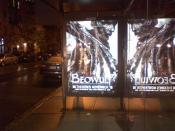"And you all know that Security is mortals' chiefest enemy."
-Hecate in "Macbeth" By William Shakespeare
For thousands of years, since the beginning of civilization, societies have striven to secure their homes by any means possible. Even Romulus, founder of one of the world's mightiest empires, started with a wooden fence, and the French general Maginot raised unscalable walls, protecting his country from the Germans with his Maginot line. However, despite the works of the greatest minds and historical figures, none of the most solid defenses kept out the enemy for long. A man could easily jump over Rome's first wall; Maginot's line was useless when the Germans found an alternative route. History is etched by this pattern of rise and fall, and while the mighty empires may see themselves as secure, disaster often occurs during these periods of great seeming security. Seeing the pattern of history, many writers and artists have adopted this phenomenon into their works.
In the Old English epic poem Beowulf, many characters pay dearly for their sense of ease, and fall prey to the same enemy that defeated Romulus and Maginot.
Perhaps the most obvious and tangible example of false security in the poem is Hrothgar's meadhall, Heorot. This hall, built on the foundation of a king's pride, appears to be set up for disaster. Early in the epic, the audience learns that Heorot's purpose was to be "a meadhall higher than humankind had ever heard of," and "highest of houses." (Beowulf, 63-64, 72) The whole concept of Heorot brings to mind the Biblical story of the Tower of Babel, built as a testimony to man's pride, it ends in tragedy. In addition, tradition tells that God's wrath on Babel came not only from men's pride, but also from the wish to reach heaven through...


